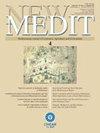妇女的技术教育是否影响农业食品的可持续性?
IF 1.2
4区 经济学
Q3 AGRICULTURAL ECONOMICS & POLICY
引用次数: 0
摘要
妇女对经济做出了决定性贡献,并在世界农业开发中发挥了重要作用,提供了她们的劳动力。但如果他们能以更公平的方式更好地获得技术和培训,他们就能做出更多贡献。实际上,该部门发生的快速技术变革对实现农业食品部门妇女与男子平等作用构成了更大的挑战。女性在培训和赋权方面的局限性使她们无法利用有助于实现一个没有饥饿和营养不良的世界的技术,这是可持续发展目标之一。因此,这项工作从培训和性别差距的角度分析了世界形势,以了解这些因素是否影响87个国家实现四个可持续发展目标(可持续发展目标2、4、510)。多元线性回归的结果表明,这些元素之间存在正相关关系。然后,以西班牙为例,从性别培训、数字性别差距和劳动力差距三个方面对其进行了分析。最后,提出了一些建议和建议,使妇女能够参与改善国家的工作。本文章由计算机程序翻译,如有差异,请以英文原文为准。
DOES WOMEN'S TECHNO-EDUCATION IMPACT THE AGRI-FOOD SUSTAINABILITY?
Women contribute decisively to the economy and have an important participation in agricultural exploitation in the world, providing their labor. But if they had better access to technology and training in a more equitable way, they could contribute much more. In effect, the rapid technological changes that have occurred in the sector pose an even greater challenge to achieve equalizing the role of women to that of men in the agri-food sector. The limitation of the female gender to training and empowerment prevents them from taking advantage of the technology that are contributing to the achievement of a world free of hunger and malnutrition, which is one of the sustainable development goals (SDG). Therefore, this work analyzes the world situation in terms of training and gender gaps to see if these elements affect the achievement of four of the sustainable development goals (SDG 2, 4, 5 10) in 87 countries. The results of the multiple linear regression show the existence of a positive relationship between these elements is demonstrated. Then, as a real example, Spain is chosen as a country reference and analyzed in terms of training by gender, digital gender gap and labor gap. Finally, some advice and recommendations that allow the achievement of the inclusion of women in the improvement of the countries are suggested.
求助全文
通过发布文献求助,成功后即可免费获取论文全文。
去求助
来源期刊

New Medit
AGRICULTURE, MULTIDISCIPLINARY-
CiteScore
2.00
自引率
30.00%
发文量
31
审稿时长
>12 weeks
期刊介绍:
New Medit is an applied economics journal, with a multidisciplinary approach, aimed at providing insights into the economic and the social transformations of agro-food sector, rural societies as well as local development and bioeconomy in the Mediterranean Basin.
Manuscripts submitted to NEW MEDIT generally should deal with wide-ranging topics that can be extended to other countries where organisational, production and market conditions and the related development policies may emerge at the corporate or regional level.
 求助内容:
求助内容: 应助结果提醒方式:
应助结果提醒方式:


